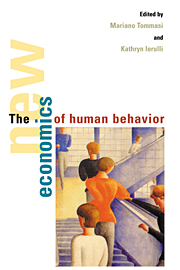Preface
Published online by Cambridge University Press: 03 December 2009
Summary
Jacob Viner, the great University of Chicago and Princeton economist, apparently once defined economics as what economists “do.” By this definition, the scope of a field is determined by the subject matter addressed by the theories prevailing in that field. And by this definition, economics has changed enormously during the past four decades, for what economists “do” has been revolutionized.
Someone entering the study of economics in the 1950s, when I did, would have found a modest theory of consumer spending on goods in the marketplace, a theory of profit-maximizing firms and market equilibrium under competition, monopoly, and other market structures, a theory of the demand for labor and capital based on given production functions and factor prices, and a rudimentary theory of public choice where governments tried to maximize “social welfare.”
Many of the most interesting social and economic issues were left out, perhaps to be studied by sociologists, political scientists, and psychologists. Economists failed to recognize that men and women not only buy apples and cars, but they also have children, rear and educate them, marry and divorce, buy luxury goods to gain prestige, take care of elderly parents without direct compensation, smoke and drink heavily, engage in crime, and discriminate sometimes viciously against blacks, Jews, women, and others.
- Type
- Chapter
- Information
- The New Economics of Human Behaviour , pp. xv - xviiiPublisher: Cambridge University PressPrint publication year: 1995

